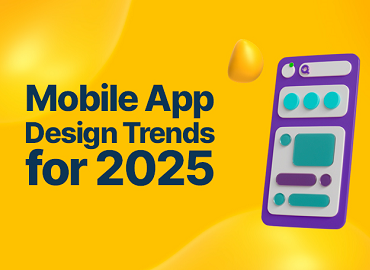Top 7 Mobile App Development Trends in 2025
by Luke Fitzpatrick
The world today can’t seem to move a muscle without using smartphones.
From ordering groceries to calling cabs, next-gen mobile apps are leading the way. With the number of global smartphone users poised to surpass 7.6 billion by 2027, the future of mobile apps looks extremely promising.
Mobile app development is a significant decision for a business. Whether you are an established company or a startup, investing in mobile app development brings multiple perks — positive customer engagement, scalability, increased revenue, and more. This article introduces you to the latest mobile app development trends for 2025 and beyond.
1. Embracing Generative AI
When it comes to developing futuristic mobile apps, generative AI is definitely a frontrunner. Thanks to its compatibility across different models and public APIs, integration is now a breeze with other emerging technologies like image recognition, NLP (Natural Language Processing), and predictive analytics.
With generative AI, mobile app developers can now readily access public APIs along with SDKs to give shape to functional mobile apps. It packs a range of customization options for images, videos, and content generation, as well as for chatbots and personal assistants.
2. Keeping It Protected With Blockchain Tech
Contrary to what many would like to believe, blockchain technology isn’t limited to cryptocurrencies. In fact, blockchain is one of the leading technologies behind modern-day mobile apps, especially for data transparency and security. The real game maker is the decentralized peer-to-peer infrastructure, the driving force behind contactless banking through mobile apps. Blockchain also allows working with distributed ledgers to protect users from any kind of data altercations, for example, in telecom.
3. IoT Mobile Apps For Connected Living
Connected living is the new flavor of the era. Look around, and you’ll see how people are glued to their devices no matter what they do. Take fitness and wellness mobile apps, for instance, where you can track your exercise routine and weight management goals and upload data via the cloud. With wearable devices like smartwatches and CGMSs becoming common, IoT cloud computing is an integral element of mobile app development.
4. Custom Enterprise Apps for Enhanced Efficiency
Leading enterprises require custom mobile apps for a range of vital processes, like automation, streamlining, and enhancing productivity. Therefore, enterprises must manage a significant volume of data. Using traditional solutions can lead to anomalies as well as the risk of data leakage. That's where you need to partner with a leading mobile app development company. It will not only ensure that the data processed across multiple devices is safe but also define productive solutions for other digital assets.
5. Mobile Wallets For Cashless Transactions
Industry research has shown the rising popularity of mobile wallets. So much so that the global mobile wallet market is predicted to hit $80 billion by 2026. Inarguably, it's the most popular among millennials who hate carrying cash on them. However, millennials aren't the only group that likes mobile wallets. For anyone with a penchant for digital life, it’s hard to overlook the convenience of NFC payments. With a single click, your payment journey is simplified!
Take the last pandemic, for instance, where mobile wallets became the chief mode of payment. The trend soon became mainstream. Today, traditional retailers and online marketplaces alike are fast integrating mobile wallets across their payment processes for security and convenience.
6. Declarative Programming For Complex Animations
Animations are a common element of design across all mobile apps. But things are a lot more complex than one can imagine. Mobile app developers often struggle to correctly fit animations across frames, but not anymore. Introducing declarative syntax, a unique programming format that both SwiftUI and React Native are now using.
With declarative programming, mobile app developers can now easily fit in multiple complex animations within seconds. The best part? It only needs a few lines of code to make things happen, thereby keeping it seamless throughout the mobile app development process.
7. Embracing Beacon Technology
Beacon technology is undoubtedly the most evolving among all mobile app trends. This modern-day tech is widely being used to create a range of apps for a particular location. Suppose you want to direct a customer to enter a physical store during the time of sale. Beacon technology can help you do that and a lot more.
Beacon tech can be used to make the retail segment more relevant and intuitive. In turn, it can help a business land more conversions. It can be a game changer for customer loyalty programs as well, and even do away with long queues and complicated checkout processes.
Summing Up
Developing mobile apps can be tricky simply because most companies would like to make one single app that packs a punch. Given the competition, it's worth knowing the trends that can help you create the perfect app for your customers.
To make it happen, it's always a wise call to hire a reputed mobile application development company that puts client needs first. Make sure to conduct thorough research to understand what the new age wants and, accordingly, choose the best mobile app development partner. Check for their capabilities and past projects and drill down through reviews before you sign the contract.

